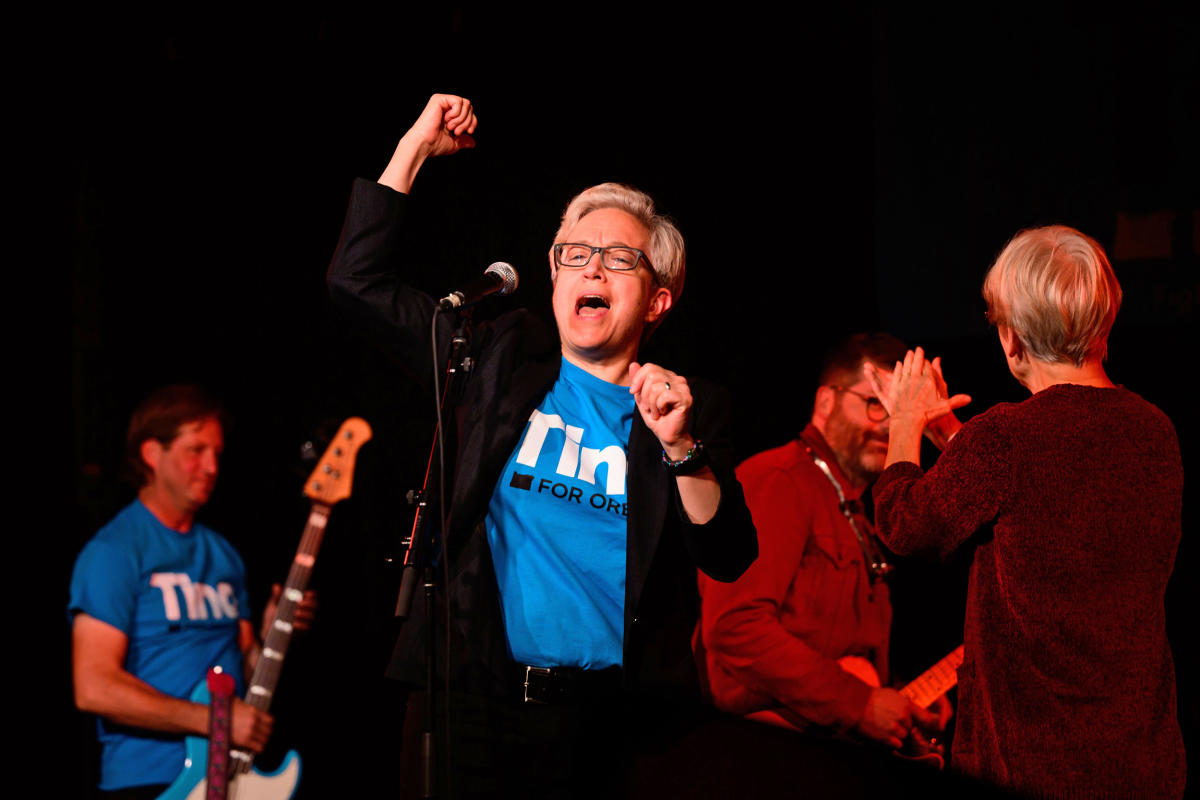
For the first time in the nation’s history, Americans from all 50 states and the District of Columbia will have a chance to elect an LGBTQ person to public office.
A new report by the political action committee LGBTQ Victory Fund found that of the 1,065 LGBTQ candidates who ran primary campaigns, a historic 678 of them — the vast majority of which are Democrats — will appear on the ballot in November, an 18.1% increase from the 2020 general election
The record-breaking election year comes as a historic number of anti-LGBTQ laws have been introduced in state legislatures throughout the country and as homophobic tropes have resurfaced in the nation’s mainstream political discourse.
“Voters are sick and tired of the relentless attacks lobbed against the LGBTQ community this year,” Annise Parker, the president and chief executive of the Victory Fund and the former mayor of Houston, said in a statement. “Bigots want us to stay home and stay quiet, but their attacks are backfiring and instead have motivated a new wave of LGBTQ leaders to run for office.”
More than 340 anti-LGBTQ bills have been introduced in state legislatures this year, according to the Human Rights Campaign, the nation’s largest LGBTQ advocacy group. The proposed legislation largely consists of measures that would limit transgender athletes from competing on school sports teams that correspond with their gender identity, access to gender-affirming care for trans people and the instruction of topics related to sexual orientation or gender identity at school.
This year, conservative lawmakers, television pundits and other public figures have accused opponents of a Florida education law — which critics have dubbed the “Don’t Say Gay” law — of trying to “groom” or “indoctrinate” children. The word “grooming” has long been associated with mischaracterizing LGBTQ people, particularly gay men and transgender women, as child sex abusers.
Gabriele Magni, an assistant professor of political science at Loyola Marymount University in Los Angeles and director of the school’s LGBTQ Politics Research Initiative, said that having queer politicians in public office can serve as a powerful tool to counter the anti-LGBTQ sentiment in the nation’s politics and policy.
He cited Sen. Tammy Baldwin, D-Wis., as an example. Baldwin, the first openly gay person elected to the U.S. Senate, led efforts to codify same-sex marriage into federal law earlier this year. The Senate will vote on the bill after the midterm elections, and Baldwin has been largely tasked with working across the aisle to earn Republican support.
“By being present in office, they make issues more personal for other legislators,” Magni said. “So, if you’re voting against some LGBTQ rights, you’re not voting against LGBTQ rights in abstract anymore, but you’re voting to deny rights to someone who sits next to you every day at work.”
Beyond getting laws passed, lesbian, gay, bisexual, transgender and queer legislators often use their political megaphones to advocate on behalf of the community, Magni added. He pointed to the pressure campaign LGBTQ lawmakers — including Rep. Ritchie Torres, D-N.Y., and Rep. Mondaire Jones, D-N.Y. — placed on the Biden administration this year to speed up the distribution of vaccines amid the monkeypox outbreak, which disproportionately affected gay and bisexual men.
Within the record-breaking election year for LGBTQ candidates, dozens of them will also have the chance to make history on their own.
Notably, Massachusetts gubernatorial candidate Maura Healey, a Democrat, and Oregon gubernatorial candidate, Tina Kotek, also a Democrat, are vying to become the nation’s first lesbian governors. Polls predict Healey to have a smooth path to victory, but a third party candidate in Oregon’s race may complicate Kotek’s chances.
If Vermont voters elect Becca Balint, a lesbian, to the U.S. House of Representatives, she’ll be the first woman and first LGBTQ person the state sends to Congress.
As gender identity and gender-affirming care have taken center stage in the nation’s policy debates on LGBTQ issues, the Victory Fund report also found that transgender, nonbinary and gender-nonconforming candidates ran for office in record-breaking numbers this year. The group represents 13.9% of this year’s LGBTQ primary and general election candidates, up from 7.9% in 2020 and 9.1% in 2018.
“Sitting on the sidelines isn’t an option when our rights are on the chopping block,” Parker said.
Follow NBC Out on Twitter, Facebook & Instagram
This article was originally published on NBCNews.com








